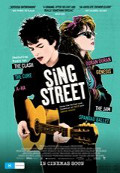
Directed by
John Carney
105 minutes
Rated M
Reviewed by
Bernard Hemingway

Sing Street
Synopsis: It’s 1985 and 14-year old Dubliner, Conor (Ferdia Walsh-Peelo ), is having a rough time of it as his parents’ marriage is crumbling and he is taken out of his Jesuit college and put in the local Catholic school where the Christian Brothers are rougher than the kids. When he meets the beautiful and super-cool Raphina (Lucy Boynton) he invites her to be in his band’s video. The trouble is he doesn’t have a band. Conor needs to think fast if he’s going to win her.
I, alone in Christendom so it seemed, wasn’t swept away by director John Carney’s 2007 debut Once, a low budget musical rom-com that was a surprise critical and commercial success, that picked up an Academy Award for Best Original Song ("Falling Slowly") and was turned into a stage production. I was even less taken by his 2013 Trans-Atlantic re-working of that film, Begin Again. With his new film, Sing Street, he’s back in Dublin in the ‘80s and once again it’s all about love and music and, one assumes, his personal history. Finally I'm won over. Carney delivers his main theme, that of the transformative power of love, with panache and nicely bouyed up by the music, a mix of originals and Top 40 hits by bands such The Cure, The Jam, Duran Duran and so on.
Although set against the real backdrop of an economically depressed Ireland, the story is itself hardly stands up to scrutiny from a realist point of view. Conor forms a band with a few mates and within the time-span of a montage they’re sounding awesome and are making videos (don’t ask where the professional video camera, a new piece of technology for the time, came from). The motivation for all this creative effort, Raphina, lives in a shelter for adolescent girls conveniently opposite Conor's school , but how she manages to look so fabulous or what she does when not making videos for Conor’s non-gigging band is never explained. This anomaly is not helped by the fact that Boynton, who was 21 playing 16, is too old for the part. Also somewhat awkwardly related narratively-speaking is Conor’s brother, Brendan (Jack Reynor), an unemployed dope-smoking recluse with a conveniently extensive record collection that he uses to guide Conor’s lightning progression through contemporary music.
But Sing Street is one of those films whose overarching momentum and moist-eyed nostalgia carries it across these kinds of cracks in credibility. If the music is an important factor here (in this respect it would make a good double bill with Jean-Marc Vallée’s 2005 film, C.R.A.Z.Y.) the film’s other trump card is Lucy Boynton, to whom Carney and cinematographer Yaron Orbach give old-fashioned star treatment, the camera lingering on her pale, fine-boned face. Aside from her make-up enhanced good looks Boynton is, age aside, quite marvellous as Conor’s dream girl, whose at first mysterious-seeming cool beauty gradually warms to reveal a conflicted vulnerability. This is in a way enough to justify her single purpose role in the film as Conor’s perfect fantasy of romantic love, a fantasy which is wonderfully realized in the film’s plum scene, in which Conor imagines himself and his band playing at an American-style high school prom.
Walsh-Peelo in his film debut is a remarkably assured player who brings a winning charm and unforced sensitivity to his role and Carney modulates the core romance with well-observed side trips into Conor’s parents' marriage and the generational and institutional brutality that was par for course for the day in Catholic schools. The relationship between the two brothers also provides an engaging sub-plot and even if Brendan is a rather idealized character one can accept this as Conor's point-of-view. Add to this a convincing recreation of the times and an ear for the local vernacular and it all makes for a winning package.
Sing Street is unapologetically designed as a feel-good film and if you can identify with the uplifting power of love, or live in hope of experiencing it, or are at least alive enough to remember what it felt like, it should work for you.

Want more about this film?


Want something different?




